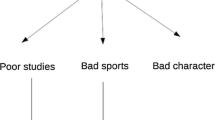Abstract
My concerns about Rational Emotive Behavior Therapy (REBT) began over a decade ago. I find its concepts lack adequate and consistent definitions, its distinctive hypotheses are not confirmed by empirical data and are untestable, and its scientific foundations fall outside mainstream psychology. Contrary to what it claims, its practice and philosophy are not consisten with the use of reason in psychotherapy. These criticisms are discussed and documented. Practitioners may not be aware of the unsubstantiated claims and theoretical assumptions inherent in REBT, and that they adopt these assumptions when practicing REBT.
Similar content being viewed by others
References
Baxley, N. (1981) (Producer).Rational-emotive therapy. (Film) Champaign, IL: Research Press.
Beck, A. T. (1963). Thinking and depression.Archives of General Psychiatry, 15 305–312.
Beck, A. T. (1976).Cognitive therapy and the emotional disorders. New York: International Universities Press.
Becker, I. M. & Rosenfeld, J. G. (1976). Rational emotive therapy—a study of initial therapy sessions of Albert Ellis.Journal of Clinical Psychology, 32, 872–876.
Cramer, D. (1985). Irrational beliefs and strength versus inappropriateness of feelings.British Journal of Cognitive Psychotherapy, 3(2), 81–83
Cramer, D., & Fong, J. (1991). Effects of rational and irrational beliefs on intensity and “inappropriateness” of feelings: A test of rational-emotive theory.Cognitive Therapy and Research, 15, 319–329.
Ellis, A. (1962).Reason and emotion in psychotherapy. New York: Lyle Stuart.
Ellis, A. (1994).Reason and emotion in psychotherapy (Revised edition). New York: Birch Lane Press.
Ellis, A. (1971).Growth through reason: Verbatim cases in rational-emotive therapy. North Hollywood, CA: Wilshire Book. Co.
Ellis, A. (1975). Creative joy and happiness: The humanistic way.The Humanist, 35(1), 11–13.
Ellis, A. (1977). The basic clinical theory of rational-emotive therapy. In A. Ellis & R. M. Grieger (Eds.),Handbook of rational-emotive therapy (Vol. I). New York: Springer.
Ellis, A. (1981). Is RET ethically untenable or inconsistent? A reply to Paul E. Meehl.Rational Living, 16(1), 38–41, 42.
Ellis, A. (1982). The treatment of alcohol and drug abuse: A rational-emotive approach.Rational Living, 17(2), 15–24.
Ellis, A. (1985). Differentiating appropriate from inappropriate feelings in RET.British Journal of Cognitive Psychotherapy, 3(2), 90–91.
Ellis, A. (1986). An emotional control card for inappropriate and appropriate emotions in using rational-emotive imagery.Journal of Counseling and Development, 65, 205–206.
Ellis, A. (1989). Is rational-emotive therapy (RET) “rationalistic” or “constructivistic”? Keynote address, World Congress of Cognitive Therapy, Oxford, England, June 30.
Ellis, A. (1993). A critique of Wessler's critique of rational-emotive therapy.Psychotherapy, 30, 531–532.
Ellis, A. (1994). (Speaker). A rational emotive behavior therapy approach to personality disorders. American Counseling Association Annual Convention, Minneapolis, MN, April 25.
Ellis, A. & Dryden W. (1987).The practice of rational-emotive therapy RET. New York: Springer.
Gardner, M. (1952).In the name of science. New York: Putnam.
Hines, T. (1988).Pseudoscience and the paranormal. Buffalo, NY: Prometheus Books.
Kassinove, H., Eckhardt, C., & Endes, R. (1993). Assessing the intensity of “appropriate” and “inappropriate” emotions in rational-emotional therapy.Journal of Cognitive Psychotherapy: International Quarterly, 7, 227–239.
Lazarus, R. S. (1984). On the primacy of cognition.American Psychologist, 39, 124–129.
LeDoux, J.L. (1995). Emotion: Clues from the brain.Annual Review of Psychology, 46, 209–235.
Plutchik, R. (1980).Emotion: A psychoevolutionary synthesis. New York: Harper & Row.
Rosen, H. (1993). Developing themes in the field of cognitive therapy.In K. T. Kuehlwein and H. Rosen (Eds.),Cognitive therapy in action: Evolving innovative practice. San Francisco: Jossey-Bass.
Ruegg, R. & Frances, A. (1995). New research in personality disorders.Journal of Personality Disorders, 9(1), 1–48.
Steinberger, M., Newell, J. D. and Garcia, L. T. (1984).Ethical issues in psychology. Homewood, IL: Dorsey Press.
Wessler, R. L. (1984a). Alternative conceptions of rational-emotive therapy: Toward a philosophically neutral psychotherapy.In M. Reda & M. J. Mahoney (Eds.),Cognitive psychotherapies: Recent developments in theory, research, and practice. Cambridge, MA: Ballinger.
Wessler, R. L. (1984b). A bridge too far: Incompatibilities of rational-emotive therapy and pastoral counseling.The Personnel and Guidance Journal, 63, 264–266.
Wessler, R. L. (1987). Listening to Oneself: Cognitive Appraisal Therapy.In W. Dryden (Ed.),Key cases in psychotherapy. London: Croom Helm.
Wessler, R. L. (1992a). Constructivism and rational-emotive therapy: A critique.Psychotherapy, 29, 620–625.
Wessler, R. L. (1992b). A reply to Ellis's critique of Wessler's critique of rational-emotive therapy.Psychotherapy, 30, 533–534.
Wessler, R. L. (1993). Cognitive appraisal therapy and disorders of personality.In K. T. Kuehlwein and H. Rosen (Eds.),Cognitive therapy in action: Evolving innovative practice. San Francisco: Jossey-Bass.
Wessler, R. L., and Hankin, S. (1988). Rational-emotive therapy and related cognitively oriented psychotherapies.In S. Long (Ed.),Six group therapies. New York: Plenum Press.
Wessler, R. A. and Wessler, R. L. (1980).Principles and practice of rational-emotive therapy. San Francisco: Jossey-Bass.
Author information
Authors and Affiliations
Rights and permissions
About this article
Cite this article
Wessler, R.L. Idiosyncratic definitions and unsupported hypotheses: Rational emotive behavior therapy as pseudoscience. J Rational-Emot Cognitive-Behav Ther 14, 41–61 (1996). https://doi.org/10.1007/BF02238093
Issue Date:
DOI: https://doi.org/10.1007/BF02238093



